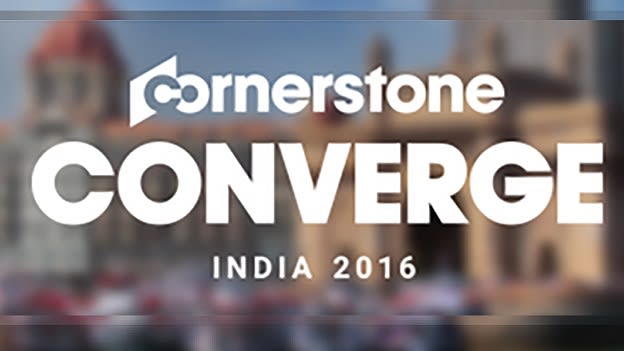High Focus on Data Analytics - #ConvergeIndia16

Kicking off the 1st India Cornerstone OnDemand Converge Conference, Arun Dhaka, Country Sales Director - Cornerstone OnDemand - India & South Asia reminisced and shared Cornerstone OnDemand’s journey globally and in specific, its journey in India. With Cornerstone OnDemand reaching 27 million users over 191 countries, Arun linked the organization’s success with its purpose of realizing potential and its culture of constantly pursuing excellence.
In the first keynote, Frank Ricciardi, Vice President and General Manager, Asia-Pacific at Cornerstone OnDemand, took the audience through the history of talent management and compared it with how disruption, today, is affecting both businesses and also the changing dynamics of the way we work, how we work, where we work & when we work. Globalization of business and connectivity, rapid technology shifts and demographic realities (it is estimated that by 2020, both the aging population and the millennial population will co-exist in the workplace) are disrupting the world as we see it. Frank shared PwC’s staggering research which revealed that 86 percent of CEOs think that technology will transform their business, however only 26% of them feel that HR is enabling business transformation. Businesses are facing the challenge of having to adapt to the new realities and CHROs and CIO have a great opportunity ahead of them, that is, to simplify the complexity of talent and build integrated solutions that enable the potential of individuals and teams.
Frank reinforced the fact that talent management system needs to be integrated and cannot be seen as a linear process as in the traditional methods. From Ricciardi’s perspective, each process in talent management is evolving and becomes successful when all elements are interconnected and integrated. He further corroborated the fact by stating that talent management process is evolving from efficiency to experience (across processes starting from recruitment); from an annual exercise to a real-rime conversation (for processes like performance management); from compliance driven to a self-directed activity (for processes like learning of career development); and from historical, rear-view data to predictive data (for talent decision making). In India, in particular, Frank argued that the challenges are more as CHROs need to play a balancing act between domestic and global competition, maintain compliance, foster innovation and manage a very diverse demographic dividend. Technology today enables navigating these extremes and also provides the flexibility as well as the integration required between areas of talent management.
Mark Goldin, CTO, Cornerstone OnDemand shared the unique strengths of Cornerstone as a unified talent management platform that is organically built and uses an integrated data model as it is based on a single technology stack that has been collecting data across customers, industries and geographies for a number of years. Mark reflected on the power of analytics in businesses today (from Amazon increasing sales by recommending products to buyers to Schneider reducing costs by predicting which machines will stop working before they actually do) and stressed on the existing usage of analytics in the context of talent management. Mark stated that organizations today are sitting on large amounts of data but have no access to insights over that data, which he termed as the “Dark Data.” He shared Cornerstone OnDemand’s new product, Cornerstone Insights, a new analytics offering that is based on Big Data and Machine Learning and aims to help decision makers across talent management challenges. Mark focused on how Cornerstone Insights will help support efforts on predictability and also prescribe actions based on data and algorithms through the example on lack of compliance in training and predicting both what will be the risks that the organization may be liable for, as well as what is suggested for the L&D leader to do to increase compliance (how many mail reminders are required, for example) bases on what actions have worked best in the past.
Traditional approaches to human capital management across the board – from recruitment to performance have radically changed. Social, mobile and Big Data applied to different contexts of talent are enabling organizations to engage, develop and make proactive decisions on their talent. The opportunities are plenty and so are the success stories, however, the question is where should one get started? Frank advises, “start where the pain is”. Technology is available but is it critical to know the problem we are solving. He concluded by stating that unified talent management combined with analytics is where strategic HR needs to happen. “Talent management is not for HR. It is for your business and your people. Good business practice + great technology and result in great outcomes.”












![E-book: HR Analytics and You [Download Now] E-book: HR Analytics and You [Download Now]](https://res.cloudinary.com/people-matters/image/upload/w_220,h_124,c_thumb,q_auto,f_auto/v1707908296/1707908294.jpg)
